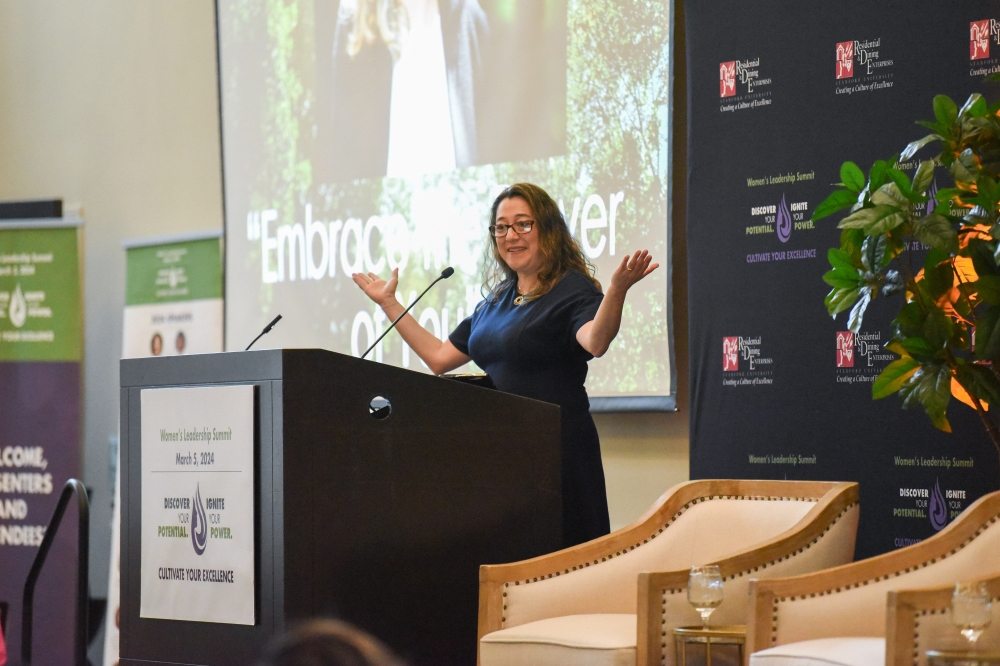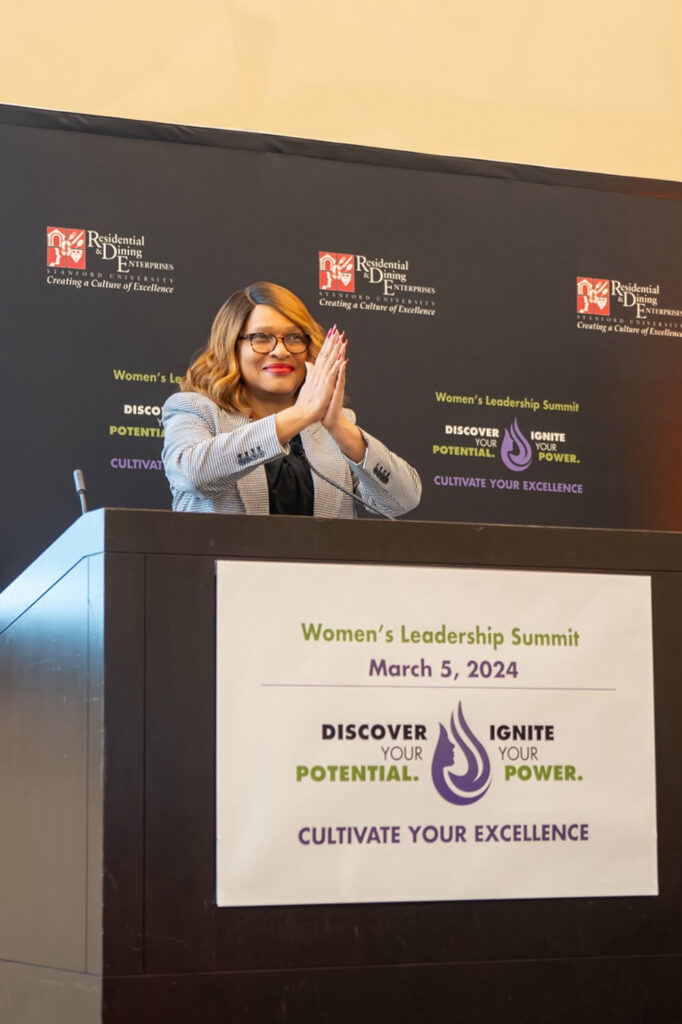Women’s Leadership Summit calls on leaders to uplift others
More than 300 people attended the conference, which included a keynote from venture investor and best-selling author Tricia Montalvo Timm.

Shirley Everett (far left) moderates a panel on “Leading With Courage: Advancing Diversity, Equity, and Inclusion Through Troubled Waters” with (from left) Patrick Dunkley, Deborah Cullinan, Ayodele Thomas, and Dr. Joyce Sackey. (Image credit: Karen Spicer)
The third annual Women’s Leadership Summit was held earlier this month and aimed to inspire and educate established and emerging leaders in the Stanford community. Hosted and founded by Shirley J. Everett, senior associate vice provost for Residential & Dining Enterprises and senior advisor to the provost on equity and inclusion, the day’s program drew more than 300 people and explored the theme: “Discover Your Potential. Ignite Your Power. Cultivate Your Excellence.”
“One of the highest callings of a great leader is to coach, mentor, and develop others,” Everett said in her opening address. “The vision for this summit was born out of my passion to motivate, educate, lift and affirm women, and help them thrive in their professional roles.”
She inspired the audience to mentor, sponsor, and develop women, especially as they transition from individual contributors to managers.
“We always want to pay homage to the women who have gone before us and upon whose shoulders we stand,” Everett said.

Board member, general counsel, investor, and author Tricia Montalvo Timm gives the opening keynote, sharing her personal journey to authenticity and how to “Embrace the Power of You.” (Image credit: Diane McClamroch)
Embrace the ‘power of you’
In her keynote address, Tricia Montalvo Timm – a board director, venture investor, speaker, and best-selling author – shared her journey to embracing her true self, owning her identity, and achieving success and fulfillment in her life and career.
She described her decades of trying to fit in and suppressing her Latina identity. Montalvo Timm cautioned that hiding who you are can lead to imposter syndrome, anxiety, depression, and burnout. She decided that after years of hiding, it was time to embrace her authentic self.
“Surround yourself with people that accept you just as you are,” Montalvo Timm said. “Stop worrying about those who don’t get you. Lean on mentors and sponsors to remind you of what you bring to an organization and to provide you with the road map to succeed in both life and career.”
Professor Margaret Neale also gave attendees insights into negotiation. She spoke about the dynamics of women negotiating and challenged attendees to reframe their perspective on negotiation as collaborative problem-solving. She shared that negotiations are interdependent, and both negotiators must voluntarily agree to an outcome.

Shirley Everett celebrates a day of transformational learning and new connections at the third annual Women’s Leadership Summit. (Image credit: Karen Spicer)
Leading with courage
Moderated by Everett, a diversity, equity, and inclusion panel focused on the challenges faced in today’s polarized society.
Deborah Cullinan, vice president for the arts, shared her mother’s journey from Scotland to America at age 17 and how it helped shape her passion for the arts.
Patrick Dunkley, vice provost for institutional equity, access, and community, shared that his formative experiences in college and law school, where there was a lack of diversity, had a big impact and inspired him to create a world where his daughters, and Stanford students, can grow and become the person they are meant to be without barriers.
A passionate advocate for equity in medicine and access to care, Dr. Joyce Sackey, chief equity, diversity, and inclusion officer for Stanford Medicine, shared her personal experiences as a young girl growing up in Ghana where she saw inequity in medicine first-hand. She challenged summit attendees to reorient how they see the issue of equity and find a path forward toward justice through a lens of empathy.
Ayodele Thomas, associate vice president of diversity, equity, inclusion & belonging for University Human Resources, talked about her family’s legacy of being in the United States for more than 200 years and how one side bought themselves out of slavery and the other escaped and fought in the Civil War. Thomas was the first Black woman to earn a PhD in electrical engineering at Stanford.

Women’s Leadership Summit host and founder Shirley Everett welcomes attendees for a day of inspiring sessions, panels, and breakouts. (Image credit: Robert Coles)
Navigating AI, leading in uncertain times
In a panel that included R&DE Chief Information Officer Paul Robles, Stanford’s Chief Information Security Officer Amy Steagall, and Ashley Thompson, JD candidate at the Stanford Law School, shared her perspective on artificial intelligence, highlighting concerns over bias in outputs, privacy, whether generated content is accurate and factual, intellectual property protections, the stifling of creativity, and liability for harms.
And finally, Jan Barker Alexander, vice president and dean of students at Pitzer College, led a panel about embarking on a journey of leadership evolution, where the panelists – Fran’Cee Brown-McClure, vice president for student affairs at Jackson State University, and Jeanette Smith-Laws, director of operations and student unions at Stanford University – talked about leading and driving change in today’s unpredictable landscape.
“We do not have to go outside of work to find uncertainty,” said Barker Alexander. “It’s always about morphing, changing, and evolving.”
In her closing remarks, Everett echoed the words of many presenters by encouraging participants to continue to mentor, sponsor, and be an ally for others.
“My hope is that diversity, equity, inclusion, and belonging becomes the foundation on which we build an equitable ecosystem,” she said. “One in which all staff can bring their whole authentic selves to work and feel like they belong, where race or any other social identity will no longer be a factor in the access of merit or the distribution of opportunity so that everyone can reach their full potential and truly thrive.”
For a more detailed account of the Summit, visit the R&DE website.